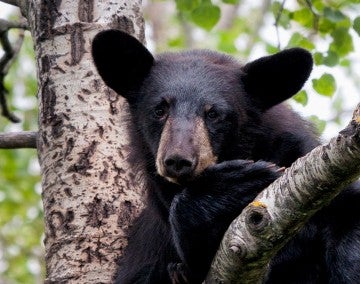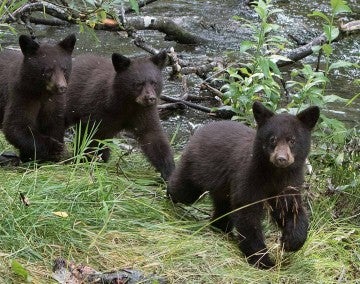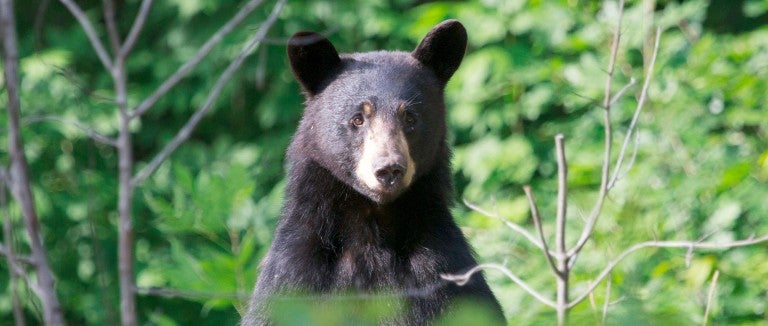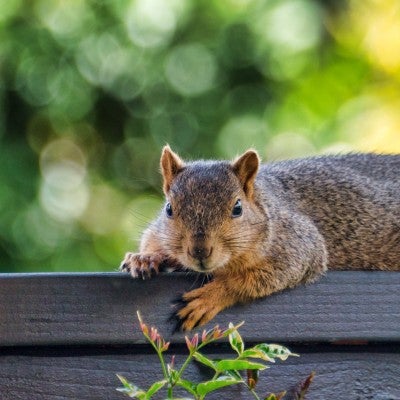As black bear numbers increase in some North American communities and more people move into bear habitat, encounters between bears and people have risen. Whether you live in bear country or are just visiting, you can take simple steps to avoid conflicts.
(Please note that this information is specific to black bears, not grizzlies.)
Contents
- Why do bears lose their fear of humans?
- What are the benefits of black bears?
- How can people prevent conflicts with bears?
- Why doesn't hunting solve conflicts with bears?
- What should I do if I encounter a black bear?
Why do bears lose their fear of humans?
Bears have acute eyesight and hearing. Their sense of smell is seven times greater than a bloodhound’s. They have a keen ability to detect pet food, garbage, barbecue grills and bird feeders—and once they locate a food source, they remember where it is.
Bears are normally wary of people, but if a bear finds food without getting frightened away, he may come back for more. Each time this happens, he can become less fearful—and this habituation can lead to problems. Conflicts can heighten during hyperphagia, a feeding frenzy in late summer and fall in which bears bulk up for hibernation, gaining 3-4 pounds and consuming 20,000 calories a day.
Bears who lose their fear of people are called “nuisance bears.” These are most often subadult males—young bears who have just dispersed from their mothers and are still learning how to obtain food—and mothers with young cubs. In many states, nuisance bears are killed or trapped and moved far away in hopes that they won’t come back. But most of the time this outcome wouldn’t have been necessary if people hadn’t made food so easy to find in the yard or trash dumpster.
Preventing Conflicts With Black Bears [PDF]
What are the benefits of black bears?
People value bears for their considerable ecological and aesthetic purposes; they are one of the most photographed and watched animals across the continent. Black bears are important in maintaining the ecological systems in their forests:
-
They disperse seeds across vast distances—even more seeds than birds.
-
Bears open up forest canopies that allows sun to filter to the forest floor, which creates greater biological diversity.
-
Bears break logs while grubbing, which helps the decomposition process and facilitates the return of nutrients to the soil.


How can people prevent conflicts with bears?
To avoid habituating the bears in your area, follow these steps.
Make trash cans inaccessible. Bring them inside at night or buy a bear-resistant trash can or an enclosure for the container.
Enclose your compost pile. Open compost piles, especially those that include kitchen scraps, are an irresistible treat in bear country. Burying compost won’t work because bears will easily find and dig it up.
Recycle wisely. If you store recyclables outside, use enclosed bins. (Persistent bears will break into even ruggedly built bins.)
Keep your barbecue grill clean and as free of drippings as possible. Move the grill away from your house when you aren’t using it, and clean it regularly with ammonia or bleach.
Rethink your bird feeders. In the summer, birds can make do with naturally available foods. If you do set up feeders, install them away from your house.
Communities experiencing bear problems can take steps such as fining people who knowingly or unknowingly feed bears, requiring bear-resistant trash cans, distributing educational flyers and training police and animal control officers in aversive conditioning techniques that use rubber bullets, fireworks and pepper spray.
Biologist Stephen Herrero: “There’s no question that it’s possible for people and bears to coexist without serious problems if we’re willing to manage our food and garbage.”
Why doesn't hunting solve conflicts with bears?
When communities start experiencing conflicts with bears, too often state wildlife agencies institute a hunt or raise the quota of an existing hunt. But a host of studies show that hunting does nothing to resolve human-bear conflicts; hunters target bears in the woods, not the ones causing problems near human habitation.
Hunting also does not permanently reduce bear populations. Numbers actually rebound with the increased availability of food.
What should I do if I encounter a black bear?
If you see a black bear in your yard, don’t fear the worst. A youngster may simply be passing through in search of a home of their own. Or an adult may be checking out an enticing smell or interesting sound. Usually when they find out there are people around, they’ll head for the hills, never to be seen again.
If you do encounter a bear, remain calm and remember that the bear is likely more scared of you than you are of them. Attacks by black bears on people are very rare and most black bears can be easily scared away with the following approach:
- Stand and face the bear directly. Never run away from or approach them.
- Make yourself look as big as possible by spreading your arms or, better yet, a coat.
- Make as much noise as possible by yelling, banging pots and pans or using other noisemaking devices.
- If the bear approaches and you have bear spray, spray the bear as they approach.
- In the very rare case that a black bear does attack you, fight back (don’t play dead).
- After the bear leaves, remove whatever attracted them to the location (barbecue grill, bird feeder, pet food or garbage).

